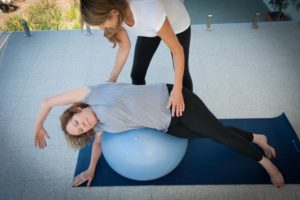What is an Exercise Physiologist?
 Exercise Physiologists (EP’s) undertake a minimum four-year university degree in exercise science and physiology. Accredited EP’s are recognised as an allied health practitioner by the Australian Government. ESSA is recognised as the self-registering body for accredited EP’s. As an accredited EP, registration with Medicare Australia, the Dept of Veterans’ Affairs, WorkCover and a number of Health funds allows provision of funded health services.
Exercise Physiologists (EP’s) undertake a minimum four-year university degree in exercise science and physiology. Accredited EP’s are recognised as an allied health practitioner by the Australian Government. ESSA is recognised as the self-registering body for accredited EP’s. As an accredited EP, registration with Medicare Australia, the Dept of Veterans’ Affairs, WorkCover and a number of Health funds allows provision of funded health services.
Health Industry Claims and Payments Services (HICAPS) is also available to assist in claiming rebates from patient health funds, Medicare and Work-Safe Victoria services on behalf of clients at the point of service.
Mandatory continued education using scientific rationale to design, implement and supervise programming for clients in order to retain accreditation with ESSA is undertaken.
All exercise physiologists receive specialist training in chronic disease management and behaviour change.
What is an Exercise Physiologist’s role?
EP’s are trained in providing individualised and group exercise and lifestyle support for chronic diseases and injury rehabilitation. By encouraging lifestyle changes
Exercise plays a vital role with regards to maintaining optimal health.
Exercise prescription is used as an intervention for:
- persons at high risk of developing or with existing chronic and complex medical conditions,
- assisting injured parties to return back to the workforce
- enabling people to maintain activities of daily living to retain their independence
- restoring one’s optimal physical function, health and wellness.
Clients presenting with the following conditions will benefit from an AEP’s services:
- Cardiovascular conditions
- Pulmonary conditions
- Metabolic i.e. T2DM, obesity, metabolic syndrome
- Musculoskeletal i.e. arthritis, osteoarthritis, osteoporosis,
- Skeletal, joint and ligament injury in relation to overuse and sporting injuries
- Workplace related injuries
- Rehabilitation both pre and post-surgery
- Mental health conditions
Information for GPs and Allied Health Professionals
The services proposed include:
- Diabetic assessment screening which will enable the client to attend exercise classes or have a home based intervention prescribed for them to aid in managing their diabetes such as; improvement in blood glucose control, reduction in body fat and cardiovascular benefits. Diabetic patients can be referred for an assessment, item 81110 and consequently for 8 exercises sessions, item 81115
- General Practitioner Management Plan (GPMP) for a maximum of 5 sessions per calendar year, item 10953
- Department of Veterans Affairs (DVA) with a referral from a GP, medical specialist or hospital discharge. Gold card holders can be treated for any condition, white card holders treated for a specific condition. A DVA client can have up to 3 initial consults within a 12 month period, with each initial consult being for a new episode of treatment.
- Workers compensation plans. After the initial assessment approval needs to be obtained from the insurance company for treatment to commence. Up to 8 treatments can be administered, whereupon another approval needs to be obtained for further treatment.
- Individual assessment of the patient. This involves screening and risk stratifying procedures to ensure that the correct exercise intervention is prescribed to the patient. Assessment procedures may include; medical and exercise history, anthropometrical measurements, cardiovascular fitness, spirometry, postural assessment, manual muscle testing, functional testing assessing balance and ability to perform ADL’s, goal setting.
- Development of safe and effective individualised clinical exercise interventions based upon the objective findings of the individual’s assessment. The exercise program is designed to improve cardiorespiratory function, body composition, muscular strength, muscular endurance or flexibility. The exercise program can be further modified for home based use, personal gym based and group exercise classes.
- Falls prevention screening for the elderly. This can be further supplemented with an individualised exercise program for use at home and group exercise classes.
 Providing rehabilitative programs for pre and post-surgical patients.
Providing rehabilitative programs for pre and post-surgical patients.- Rehabilitation exercise programs for clients suffering from work place injury enabling them to return to a pre injury normalised state and return to work.
- Development of exercise programs to aid in rehabilitation for pain management and engagement of fundamental movement patterns.
- Advice on health education and support with a strong focus on achieving behavioural change. This is provided to enhance the patients’ health and wellbeing, decrease the risks of developing chronic disease and maintaining independence.
- Suggesting dietary practices for health-related nutrition to support healthy weight management and assist in lowering the risk factors associated with heart disease and stroke i.e. hyperlipidaemia, dyslipidemia, hypertension. Dietary management guidelines are in conjunction with but not limited to the recommendations by the National Stroke Foundation Australia and World Heart Federation.
Being affiliated with Vibrant Energetics enables the AEP to work with other allied health professionals to ensure the client receives the optimal standard of care.



